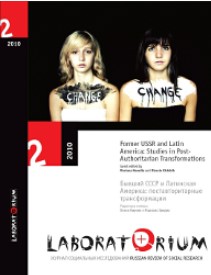ACCOUNTABILITY STRUGGLES IN DEMOCRATIC ARGENTINA: CIVIC ENGAGEMENT FROM THE HUMAN RIGHTS MOVEMENT TO THE NÉSTOR KIRCHNER ADMINISTRATION
ACCOUNTABILITY STRUGGLES IN DEMOCRATIC ARGENTINA: CIVIC ENGAGEMENT FROM THE HUMAN RIGHTS MOVEMENT TO THE NÉSTOR KIRCHNER ADMINISTRATION
Author(s): Enrique PeruzzottiSubject(s): Human Rights and Humanitarian Law, Civil Society, Political history, Government/Political systems, Political behavior, Politics and society, Post-War period (1950 - 1989), Socio-Economic Research
Published by: Центр независимых социологических исследований (ЦНСИ)
Keywords: Argentina; civic engagement; Human Rights Movement; civic politics of accountability; Néstor Kirchner;
Summary/Abstract: Argentina’s current democratic period, inaugurated in 1983, has differed markedly from the country’s previous democratic experiences as a result of a new form of relationship between citizens and politicians, particularly the emergence of a more sophisticated and demanding citizenry determined to translate preexisting ideals of democratic representation into a novel civic concern for governmental accountability. The dramatic experience of state terrorism under the last military dictatorship, which governed the country from 1976 to 1983, gave rise to a new actor—the human rights movement—which would play a crucial pedagogic role in Argentine society, introducing a much-needed concern for rights and the rule of law into the country’s political culture. The emergence in broad sectors of Argentine civil society of a new civic sensibility regarding breaches of law by public officials resulted in the rise of a new breed of civic politics aimed at improving the accountability of government.
Journal: Laboratorium. Журнал социальных исследований
- Issue Year: 2/2010
- Issue No: 2
- Page Range: 65-85
- Page Count: 21
- Language: English

